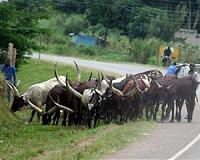 |
Cairo (UPI) May 18, 2011 Egypt, struggling to consolidate a revolution that deposed President Hosni Mubarak in February, faces what could be even worse turmoil because the country is running out of food as well as the money to buy it. Food prices went up 10.7 percent in April compared to the same month in 2010, government statistics indicate. At the same time, Egypt's annual urban inflation rate surged past 12 percent in April, underlining how key factors that triggered the popular uprising that forced Mubarak from office after 30 years remain in play. A dozen other Arab states were roiled by similar uprisings, some much less intense than Egypt's. But food prices and related economic grievances played a big part in these upheavals, unprecedented in modern Middle Eastern history. It began in Tunisia, where longtime President Zine el-Abidine Ben Ali was driven from office in January. Then Mubarak was toppled. Three other Arab dictators teeter on the brink: Moammar Gadhafi of civil war-wracked Libya, Ali Abdullah Saleh of Yemen -- whose country is actually running out of water and on the cusp of critical food shortages -- and Bashar Assad of Syria who has sent tanks into the streets to crush protests in which demonstrators howled for his removal. What transpires in Egypt, long the leader of the Arab world, could be a pointer to how other Middle Eastern states may emerge from their wrenching political upheavals. "The most populous country in the Arab world shows all the symptoms of national bankruptcy -- the kind that produced hyperinflation in several Latin American countries during the 1970s and 1980s -- with a deadly difference: Egypt imports half its wheat and the collapse of its external credit means starvation," Asia Times Online observed May 10. "The civil violence we have seen foreshadows far worse to come. The Arab uprisings began against a background of food insecurity, as rising demand from Asia priced the Arab poor out of the grain market. "The chaotic political response, though, threatens to disrupt food supplies in the relative near term. Street violence will become the norm rather than the exception in Egyptian politics." This bleak assessment in Asia Times Online's Spengler column was underlined by a warning from Ahmad al-Rakaibi, head of Egypt's Holding Company for Food Industries, of "acute shortage in the production of food commodities manufactured locally as well as a decline in imports of many goods, especially poultry, meat and oil." Egypt is reported to have only four months' supply of wheat on hand and only one month's supply of rice. According to Al-Ahram, Egypt's leading daily, hoarding of rice by wholesalers has pushed prices up by 35 percent this year. Egypt's foreign exchange reserves have fallen by $13 billion, or roughly one-third, in the first quarter of the year amid a flight of capital. The business elite who flourished under Mubarak and ran the economy for half a century are hustling their wealth to safer climes. Rising food prices is a global problem but the Middle East is particularly at high risk because of chronically high levels of unemployment and low incomes. Mushrooming populations are an added factor. Arab countries have among the highest population growth rates in the world. The overall Arab population was 73 million in 1950. Today, it's more than four times that at 333 million. It will nearly double again by 2050, to around 600 million. Following the 2008 food price crisis, which triggered bread riots in Arab cities, some regional states, increased public sector wages and sought to aid the poor by increasing bread subsidies. But those measures weren't sustainable without increased revenues, which weren't forthcoming. The non-oil producers all have fiscal and trade deficits. The wealthy oil states of the Persian Gulf produce little food and import 85 percent of basic food requirements. The Arab world's dependence on imported food isn't likely to change anytime soon. The regional states have little arable land and even less water and worsening climate change will make their food situation even more precarious. "Arab countries are very vulnerable to fluctuations in international commodity markets because they are heavily dependent on imported food," a recent World Bank report cautioned. "No Arab country is protected from future food-price shocks."
Share This Article With Planet Earth
Related Links Farming Today - Suppliers and Technology
 Livestock genes could protect against one of Africa's oldest animal plagues
Livestock genes could protect against one of Africa's oldest animal plaguesNairobi, Kenya (SPX) May 18, 2011 An international research team using a new combination of approaches has found two genes that may prove of vital importance to the lives and livelihoods of millions of farmers in a tsetse fly-plagued swathe of Africa the size of the United States. The team's results were published in the Proceedings of the National Academy of Sciences (PNAS). The research, aimed at finding the biological k ... read more |
|
| The content herein, unless otherwise known to be public domain, are Copyright 1995-2010 - SpaceDaily. AFP and UPI Wire Stories are copyright Agence France-Presse and United Press International. ESA Portal Reports are copyright European Space Agency. All NASA sourced material is public domain. Additional copyrights may apply in whole or part to other bona fide parties. Advertising does not imply endorsement,agreement or approval of any opinions, statements or information provided by SpaceDaily on any Web page published or hosted by SpaceDaily. Privacy Statement |